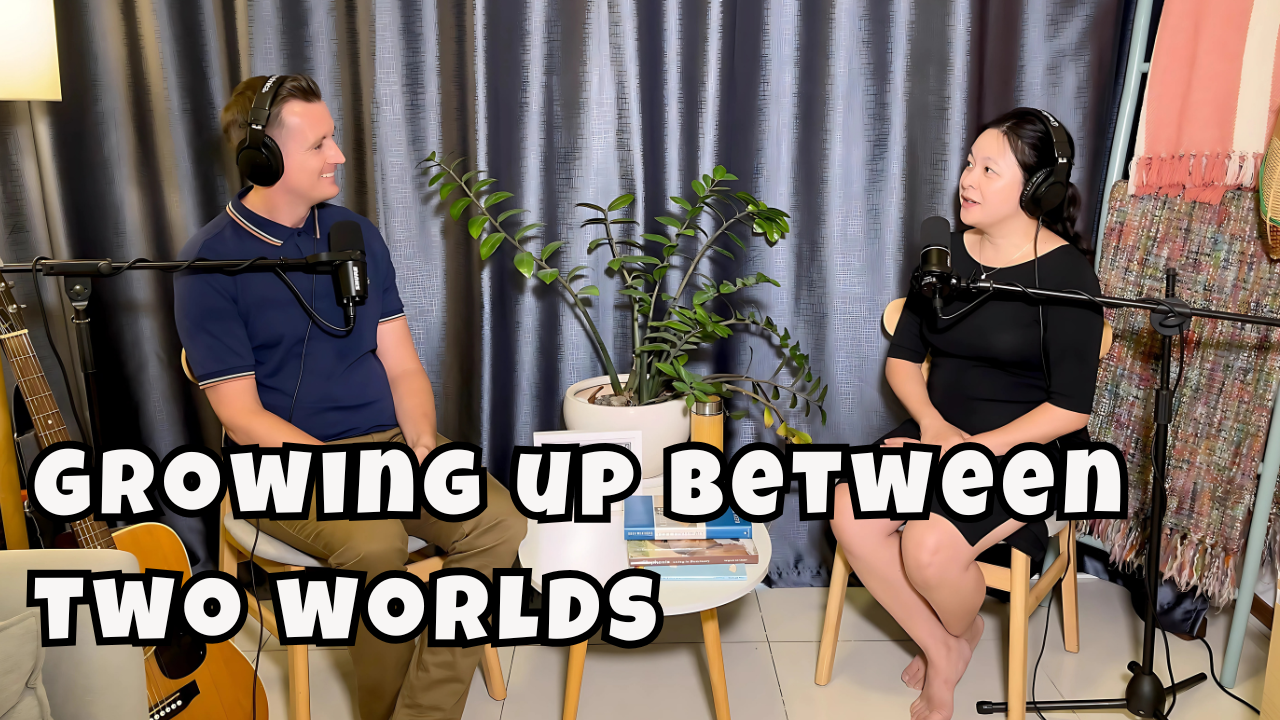I brought another Viet Kieu’s story this time, Anni Vo. She’s a university lecturer, a powerhouse community builder, and someone you’ve probably met at one of her many networking events across Saigon.
Born in Saigon, raised in New York, and now back in Vietnam running a business and raising a family, her journey is one of resilience, adaptation, and rediscovery.
The Road From Vietnam To New York
One of the things I love most about doing A Vietnam Podcast is hearing about the different paths people have taken in life. Annie’s story started in Saigon and took her all the way to New York City and back again.
How did a small girl get to New York?
Annie didn’t go to America as a refugee. Her mother worked as an interpreter for international organizations in Vietnam. Through that work, she met a law professor from NYU who was so impressed by her English skills that he helped her get a scholarship to study in New York.
That moment—an international connection and someone believing in her—changed the course of both their lives. Annie followed her mum to the U.S. as a dependent, beginning a new life that would shape who she is today.
This part of her story reminded me how much can change when one door opens. It also made me think about the importance of mentors, allies, and the role we can play in helping others step into bigger opportunities.
Sweet memories from Vietnam
Annie left Vietnam at five and a half years old. Many people don’t remember much from that age, but she recalled a lot. She spoke of living with grandparents in District 1, where her dad had a small dental setup at home. Life was simple and hard at the same time. A piece of chocolate or a bit of cheese was considered a treat. Birthdays came with only a few gifts, but those gifts were treasured.
It’s easy to overlook these moments now, especially when we live in a world of instant access and abundance. But Annie’s stories reminded me of how meaning often comes from scarcity—and how gratitude can shape our entire outlook on life.
Starting A New Life in America
When Annie left Vietnam, she was just five and a half years old. I asked her what it was like to arrive in America, and I was surprised when she said it was actually a bit lonely. She had to leave behind everything she knew—her family, her language, her culture—and move to a country where nothing felt familiar.
Annie’s arrival in America wasn’t a fairy tale. It was lonely and confusing. She moved between relatives in Chicago and LA before joining her mum in New York. She started school without knowing any English and couldn’t even ask where the toilet was on her first day.
That hit me. I remembered how scary it was for me just to change schools as a kid—and I spoke the language! But Annie adapted. Within a few weeks, she picked up enough English to get by. Not because she had a choice, but because she had to.
There’s a quiet strength in that kind of experience. It’s a reminder of how much kids can handle—and how important it is to support them in those moments, even when they seem small from the outside.
How experience taught her lessons
Annie believes that early experience helped shape who she is today. She learned how to adapt quickly, how to connect with people, and how to spot others who might feel left out—because she was once that person too.
She moved to New York when she was nine, and they lived in different parts of the city, including the Lower East Side before it became trendy. New York back then had a tougher reputation. She didn’t have the “typical” New York upbringing though. She mostly stayed focused on school and home.
But, like every true New Yorker, she picked up some street smarts. She told me how important it was to “look purposeful” when you’re walking down the street. That made me laugh. But it’s true—if you walk too slowly or look lost, you’ll annoy the people behind you… or worse, catch the wrong kind of attention.
Early shaping of identity
I asked Annie when she began thinking of herself as Vietnamese American. She said she didn’t think of it that way at first—she was just both. At home, she was Vietnamese. Outside, she was American. It was only later that she started putting those pieces together.
For anyone living between cultures, that mix can feel confusing. But what Annie showed was that you don’t always need to choose. You can be both. You can belong to more than one world. And maybe that’s what being truly global means today.
Coming Home and Building a Life in Vietnam
Talking about what it was like the first time she came back to Vietnam after moving to the U.S., she told me it happened in 10th grade. That trip was a big moment for her. She hadn’t seen her dad in years—he had to return to Vietnam when his visa expired—and reconnecting with him after so long felt special. It was a homecoming, not just to her country, but to her family too.
Difficulties with the language
She said that visit didn’t feel like culture shock because she stayed close to her family the whole time. But coming back to live in Vietnam—eight years ago now—that was a different story. That’s when the reverse culture shock hit. She thought she was fluent in Vietnamese—but everyday life, managing a business, and writing emails in Vietnamese (especially with all those diacritics!) were a whole new challenge.
We ended up talking about how complicated Vietnamese typing is. I never knew that even though Vietnamese people use the same Roman alphabet keyboards we use, they have to download special typing software. That way, they can type all the accents properly. It made me realize how much extra effort goes into just writing something in Vietnamese. Respect!
The reason for the return
Annie made this decision because of her family. She was pregnant with her second daughter, and her parents were living in Vietnam. She wanted to be close to them for the birth, and especially wanted her mum’s help (no offense to her dad!). There had also been years in her childhood when she had lived far from her parents, so she wanted to make up for that.
The plan was to stay for just a year or so, then move to Australia, where her husband, who is Vietnamese-Australian, was based. But like so many people I’ve met, that one year turned into eight. Vietnam has a way of pulling you in.
Life in Vietnam: How was it?
For Annie, it was more than just comfort. It was meaningful. Her husband joined the family dental clinic, and together they’ve been running it, taking over from her dad as he moves into retirement. She said it’s been really rewarding—helping patients, managing staff, and building on her dad’s legacy. It’s something she couldn’t have imagined doing in the U.S.
She also spoke about how special it is for her kids to grow up in Vietnam. They get to spend time with their grandparents, speak Vietnamese fluently, and really understand their heritage. That kind of connection is hard to maintain when you’re living far away.
And Vietnam itself has been full of opportunities. Annie now teaches business law at Keiser University Vietnam. They actually reached out to her because she has a JD from the U.S., and that qualified her to teach. She said it wasn’t something she was looking for, but it turned into a great way to share her experience with Vietnamese students. It’s the kind of chance she probably wouldn’t have had if she stayed in America.
How Saigon Has Changed
We laughed about “xích lô” rides and how they’ve become more of a tourist photo-op than real transportation. It says a lot about how much the city has changed. Saigon back then was quieter, with fewer cars and more bicycles. Annie remembered riding in a xích lô on her grandmother’s lap—something few locals do anymore.
Cities change, but what stays is the feeling of home. And sometimes, that feeling evolves with us.
Final Thoughts
Annie’s story is about more than just moving between countries. It’s about moving between identities, generations, and opportunities. It’s about holding on to your roots while growing into something new. It’s about how family, language, and legacy can guide your biggest life choices.
Our conversation hasn’t stopped there. Follow for the next part of the journey!
This Season is sponsored by Premier Dental. Discover the potential of a confident and healthy smile with the excellent dental clinic in Ho Chi Minh

